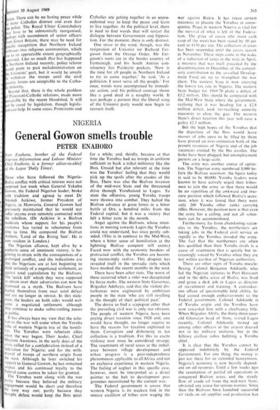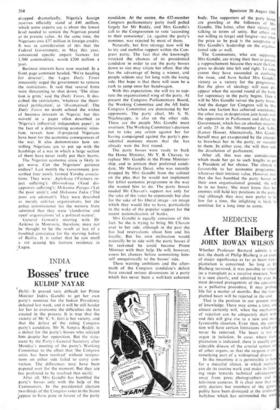NIGERIA
General Gowon smells trouble
PETER ENAHORO
eter Enahoro, brother of the Federal igeriatt Information and Labour Minister hid f Enahoro, is a former editor-in-chief f the Lagos 'Daily Times'.
ose who have followed the Nigeria-
tafra conflict with critical interest were not urprised last week when General Yakubu Gowon, the Federal Nigerian leader, broke with tradition and agreed to meet Dr
namdi Azikiwe, former President of 'geria, in Monrovia. General Gowon had reviously maintained that he would not utter anyone even remotely connected with the rebellion. (Dr Azikiwe is a Biafran moderate whose support for his people's esistance has varied in vehemence from time to time. He composed the Biafran nthem, 'Land of the Rising Sun'. He is now resident in London.) The Nigerian alliance, kept alive by a euphoric sense of imminent victory, is be nning to strain with the consequences of a prolonged conflict, and the indications are that the Nigerians are at last beginning to think seriously of a negotiated settlement, as against total capitulation by the Biafrans. The 'quick kill' which they were supposed to obtain over their adversaries can now be dismissed as a myth. The Biafrans have hauled themselves from near total defeat and are no longer in retreat. In this stale- mate, the leaders on both sides would wel- ome a negotiated settlement, although hey continue to make sabre-rattling noises n public.
It has always been my view that the solu- tion to the war will come when the Yoruba tribe of western Nigeria tire of the hostili- t es. The Yorubas were reluctant allies When the war began. Their leader, Chief Obafemi Awolowo, in the early days of the crisis, called for a confederation instead of a federation for Nigeria; and for the with- drawal of troops of northern origin from the west. Although he later switched his support to General Gowon, he has remained suspect and his continued loyalty to the Federal cause cannot be taken for granted. The Yorubas went along with the war Partly because they believed the military engagement would be short and therefore the easy way out; partly because they hought defeat would keep the lbos quiet
for a while; and, thirdly, because at that time the Yorubas had no troops in uniform sufficient to back a tribal militancy like the lbos. Unsaid but also relevant at the time was the Yorubas' feeling that they would pick up the spoils after the exodus of the lbos. There was also the Biafran invasion of the mid-west State and the threatened drive through Yorubaland to Lagos. To stem the offensive, young Yoruba troops were thrown into combat. They halted the Biafran advance at great losses in a bitter battle at Ore, a hundred miles from the Federal capital; but it was a victory that left a bitter taste in the mouth.
Anger against the Biafrans, whose inten- tions in moving towards Lagos the Yorubas could not understand, has since gently sub- sided. (This is in contrast to the Mid-West, where a bitter sense of humiliation at the lightning Biafran conquest still exists.) Faced now with the economic burdens of protracted conflict, the Yorubas are becom- ing increasingly restive. This disquiet has revealed itself in the sporadic riots which have marked the recent months in the west.
There have been other riots. The worst of these occurred when a ruler was decapitated by fierce mobs. The western State Governor, Brigadier Adebayo, said that the violent dis- turbances were engineered by ambitious people in the state 'who are still revelling in the thought of their political past.'
The desire to find a scapegoat other than the prevailing civil war is only too obvious. The people of western Nigeria have been paying direct taxation since 1928 and, one would have thought, no longer require to have the reasons for taxation explained to them. Corruption and dishonesty in tax collection is a tradition. For this to excite violence now must be considered strange. The resentment of rural areas at the imbal- ance between village development and urban progress is a post-independence phenomenon applicable to all Africa and not an exclusive experience in western Nigeria. The feeling of neglect in this specific case, however, must be interpreted as a direct pointer to the halt to development pro- grammes necessitated by the current war.
The Federal government is aware that western Nigeria is its weakest link in the uneasy coalition of tribes now waging the war against Biafra. It has taken certain measures to placate the Yorubas in conse- quence. Peace in western Nieeria is vital for
the survival of what is left of the Federa- tion. The price of cocoa (the main cash
crop of the west) has been raised by 50 per cent to £150 per ton. The collection of taxes has been suspended until the cocoa season in November. These steps came in the wake of a reduction of taxes in the state in April, a measure that was itself preceded by the discontinuation in December of the compul- sory contribution to the so-called Develop- ment Fund set up to strengthen the war chest. The western State is now enjoying the lowest tax rate in Nigeria. The western State budget for 1969-70 plans a deficit of £5.2 million. This should be compared with
the Mid-West State where the government, realising that it was heading for a £2.8 million deficit, took far-reaching austerity measures to close the gap. The western State's direct taxation this year will raise a paltry £2.3 million.
But the high hopes of the Yorubas that the departure of the lbos would leave masses of jobs open to be tilled by them have proved an over-estimation both of the present resources of Nigeria and of the job vacancies created by the lbo exodus. The holes have been plugged, but unemployment persists on a large scale.
The army was another source of optim- ism. The Nigerian army numbered 8,000 be- fore the Biafran secession: the figure today is said to be 80,000. Yoruba leaders were known to have actively urged their tribes- men to join the army so that there would be no repetition of the awkward and inse- cure position which followed Biafra's seces- sion, when it was found that there were only 200 Yoruba other ranks carrying rifles. However, the position now is that even the army has a ceiling, and not all volun- teers can be accommodated.
Furthermore, far from abandoning vacan- cies to the Yorubas, the northerners are taking jobs in the Federal civil service as rapidly as the Yorubas invaded the army. The fact that the northerners are often less qualified than their Yoruba rivals is a cause of resentment that is quietly but in- creasingly voiced by Yorubas when they are not within earshot of Nigerian authorities.
There are other signs of Yoruba muscle- flexing. Colonel Benjamin Adekunle, who led the Nigerian victories in Port Harcourt and in the delta areas of Biafra, was fired and given a desk job in Lagos as director of recruitment and training. A cantanker- ous officer of questionable field ability, he had caused enough embarrassment to the Federal government. Colonel Adekunle is of Yoruba origin and the Yorubas have now rewarded him with a chieftaincy title. When Brigadier Afrifa, the thirty-three-year- old Ghanaian head of State, visited Lagos recently, Colonel Adekunle turned up among other officers at the airport dressed not in his military uniform, but in the billowy civilian robes befitting a Yoruba chief.
It is clear that the Yorubas cannot be appeased indefinitely by the Federal Government. For one thing, the money is just not there for an extended honeymoon. Nigeria's economy is now heavily depend- ent on oil revenues. Until a few weeks ago the resumption of partial oil operations in conquered Biafran areas, and the steady flow of crude oil from the mid-west State. obviated any cause for serious worries. Since then the Biafrans have launched successful air raids on oil supplies and production has
dropped dramatically. Nigeria's foreign reserves officially stand at £40 million, which some experts say is about the lowest level needed to sustain the Nigerian pound at its present value. At the same time, the Nigerians owe £37 million in foreign credits. It was in consideration of this that the Federal Government, in May this year, announced specific import licences for 1,500 commodities, worth £200 million a year.
Business interests have now reacted. In a front page comment headed, 'We're heading for disaster', the Lagos Daily Times innocently urged the government to remove the restrictions. It said that several firms were threatening to shut down. 'The situa- tion is grim,' said the Daily Times. It des- cribed the restrictions, 'whatever the theor- etical justification', as 'ill-conceived'. The Daily Times no doubt echoed the wishes of business interests in Nigeria; but this naivete in a paper often described as 'Nigeria's influential independent paper', in the face of a deteriorating economic situa- tion, reveals how ill-prepared Nigerians have been for the economic consequences of the war. It also demonstrates how un- willing Nigerians are to put up with the hardships of a war in which a large section of them have never really put their hearts.
The Nigerian economic crisis is likely to get worse. Can the Nigerians' patience endure? Last month the Government pro- scribed four newly formed Yoruba associa- tions. They were: Agbekoya ('Farmers re- ject suffering); Olorankoya ('God dis- approves suffering); Mekunnu Parapo ('Let the poor unite); and Mekunnu Taku (`The poor are adamant). They were described as merely anti-tax organisations, but the police commissioner for the western State admitted that they were 'clandestine and open' organisations 'of a political nature'.
General Gowon's meeting with Dr • Azikiwe in Monrovia, therefore, must not , be thought to be the result at last of a troubled conscience for the starving babies of Biafra. It is rather that he can smell a rat around his fortress residence in Lagos.



































 Previous page
Previous page